
 Sweden
Sweden
- TitleColor: #333333
- DateColor: #999999
- SizeFont: 60
- FlagImg URL: /images/flags/Flag_of_Sweden.svg
- TitleImageSizes: 1900,1440,720
Sweden – Contents
General Information Toll Roads Speed Limits Petrol Parking Insurance Car Equipment TiresGeneral Information
About roads, speed limits, mandatory car equipment, and some traffic rule requirements. In the sections below, you can read more detailed information about toll roads, petrol costs, parking, speed limits, etc.
| no road tolls, except for some bridges | |
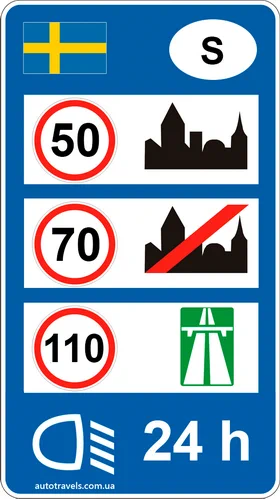 |
urban area – 50 km/h outside urban area – 70 km/h motorway – 110 km/h mandatory dipped headlights |
| maximum blood alcohol level 0.2 ‰ talking on the phone while driving is prohibited |
|
| winter tires mandatory from Dec 1 to Mar 31, chains allowed on snow or ice, studded tires allowed from Oct 1 to Apr 15 |
|
mandatory equipment:
|
|
| seat belts are mandatory for all passengers for transporting children – child seat/booster required for children up to 15 years old with a height of up to 135 cm |
Toll Roads
In Sweden, there is no toll for traveling on roads. Only the passage through certain bridges and tunnels requires payment.
Cost of Crossing Bridges and Tunnels in Sweden
In Sweden, the passage through certain bridges is subject to a fee. Additionally, in Stockholm and Gothenburg, there is a congestion tax.
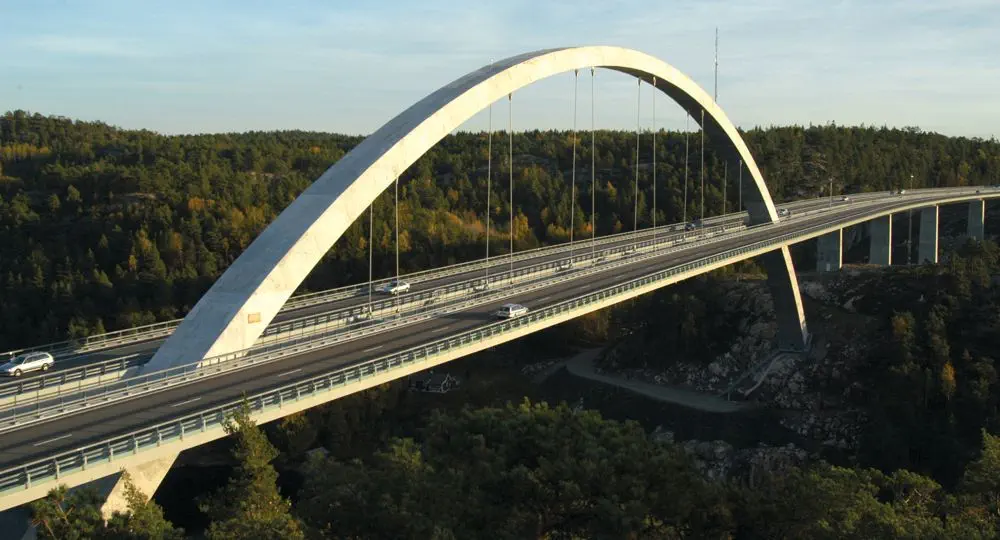
Svinesund Bridge
Svinesund Bridge, or Svinesundbrua, is a bridge over the Iddefjord inlet, marking the border between Sweden and Norway. The bridge is part of the E06 highway (between Gothenburg and Oslo) and serves as the westernmost border crossing between the two countries. Approximately 15,000 vehicles cross the bridge daily.
Svinesund Bridge and the old bridge were toll roads in both directions. Toll collection was discontinued on March 15, 2021. Currently, crossing the bridge is free of charge.
Svinesund Bridge on Google Maps

Öresund Bridge
Öresund Bridge is a combined road and rail bridge connecting the Danish island of Zealand with the Scandinavian Peninsula, spanning the Öresund Strait. Over 60,000 vehicles cross the bridge daily, making it a popular link between Copenhagen and Malmö.
Important information for Ukrainian vehicles, emergency services, or refugees crossing the bridge. As of March 1, 2022, all passenger cars with Ukrainian license plates can cross the Öresund Bridge free of charge.
Tolls for crossing the Öresund Bridge
| Vehicle | Cost | |
|---|---|---|
 |
Motorcycles | 230 DKK € 30,85 |
 |
Car | 455 DKK € 61 |
 |
A car with a trailer | 910 DKK € 122 |
 |
Camper (home on wheels) | 910-1600 DKK € 122-215 |
More about tariffs: https://www.oresundsbron.com/en
You can buy a ticket online: https://www.oresundsbron.com/en/onlineticket
Payment Methods for Öresund Bridge Toll
Signs at the toll station indicate the way to each lane. You must determine the payment method and vehicle type before entering the toll collection point.
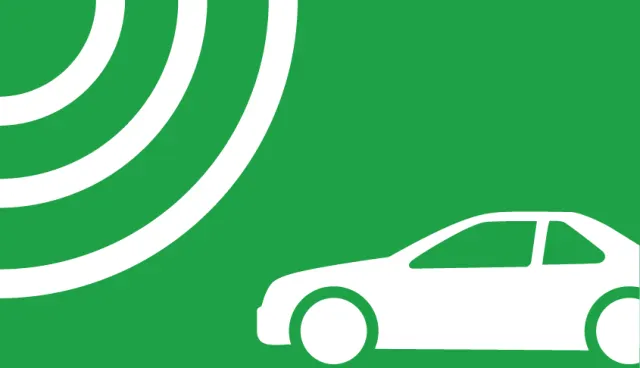 Passenger cars, cars with trailers, campers (motorhomes), motorcycles
Passenger cars, cars with trailers, campers (motorhomes), motorcycles
- Payment by license plate or BroBizz
- Pay with iTICKET/online ticket with added license plate
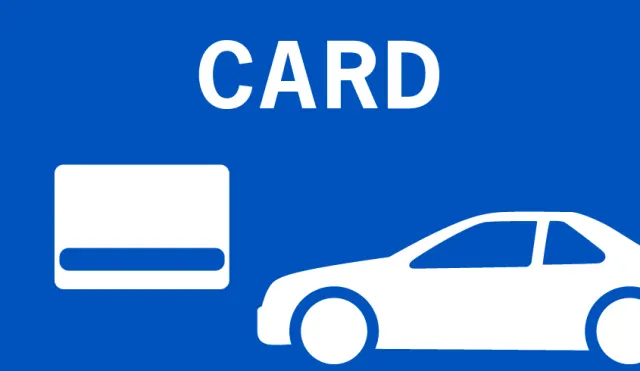 Passenger cars, cars with trailers, campers (motorhomes), motorcycles
Passenger cars, cars with trailers, campers (motorhomes), motorcycles
- Pay with a card or iTICKET
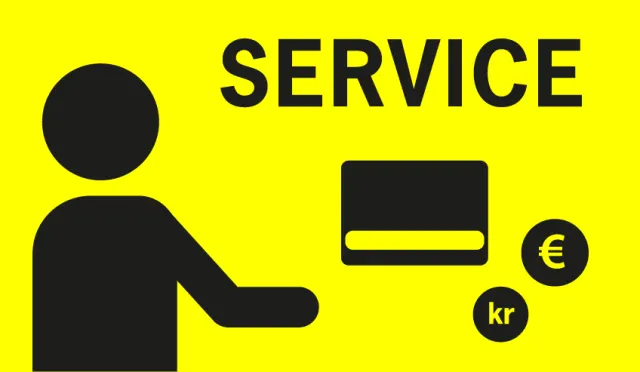 All vehicles
All vehicles
- Cash payment
- Personal assistance required
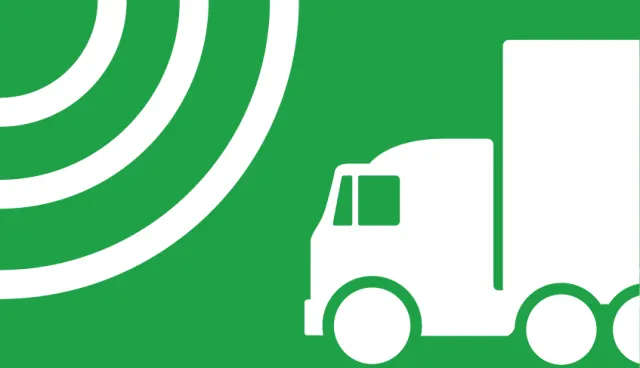 Buses and trucks
Buses and trucks
- Pay by license plate, BroBizz, or iTICKET
- Card payment without an agreement
Note! All lanes at the toll station are equipped with license plate scanning. This means that if license plate scanning is included in your contract, it will be scanned even if you are using a lane designated for manual control. You can always add and remove license plates by logging into your account.
If you entered the wrong lane or do not understand what to do, drive into the yellow lane. Even if you entered the entrance incorrectly, drive into the yellow lane at the exit, and assistance will be provided.

Sundsvalls Bridge
Sundsvall Bridge is a bridge spanning the Sundsvall Bay in Sundsvall, Sweden. It crosses the Sundsvall Bay, bypassing the city.
The roadway of the bridge is classified as a motorway and is part of the European Route E4.
The bridge has a length of 2109 meters and was opened for traffic on December 18, 2014. It is the fourth longest bridge in Sweden.
Starting from February 1, 2015, a toll of 9 Swedish kronor is collected for cars, light trucks, and buses. Heavy trucks are charged 20 Swedish kronor.
Sundsvalls Bridge on Google Maps
Tolls for crossing Sundsvalls Bridge:
| Vehicle | Cost | |
|---|---|---|
 |
Motorcycles | free |
 |
Car | 9 SEK (€ 0,80) |
  |
Minibuses and buses | 9 SEK (€ 0,80) |
More about tariffs (in Swedish): www.transportstyrelsen.se
How to Pay
If the vehicle is registered abroad, the Swedish Transport Agency has entrusted a partner with the responsibility to identify the vehicle owner, send invoices, and receive payments through EPASS24.
For rented cars, toll fees are usually added to the rental cost. However, this is something you need to clarify directly with the car rental company.

Motala bridge Motala
Motala Bridge is the name of a road bridge spanning north to south across the Motala Inlet, a part of Lake Vättern, which flows into Motala and is called Skepparplinan at its narrowest point. The bridge is a high bridge that allows boat traffic on the Göta Canal to pass underneath.
Tolls for crossing Motala Bridge:
| Vehicle | Cost | |
|---|---|---|
 |
Motorcycles | free |
 |
Car | 5 SEK (€ 0,45) |
  |
Minibuses and buses | 5 SEK (€ 0,45) |
More about tariffs (in Swedish): www.transportstyrelsen.se
How to Pay
If the vehicle is registered abroad, the Swedish Transport Agency has entrusted a partner with the responsibility to identify the vehicle owner, send invoices, and receive payments through EPASS24.
For rented cars, toll fees are usually added to the rental cost. However, this is something you need to clarify directly with the car rental company.
Congestion Tax in Stockholm and Gothenburg
In Sweden, a congestion tax system is applied in Stockholm and Gothenburg. Previously, this tax applied only to vehicles registered in Sweden.
Since January 1, 2015, this tax has been applicable to both Swedish and foreign-registered vehicles. No need to stop at a control point for payment. When crossing a control point, a surveillance camera captures the vehicle's registration number. The image is sent to the Swedish Transport Agency (Transportstyrelsen), where vehicle identification takes place.
Who Needs to Pay the Tax
The congestion tax applies to passenger and commercial vehicles, as well as buses with a total weight of less than 14 tons. Motorcycles and mopeds are exempt from this tax.
Control Points in Stockholm
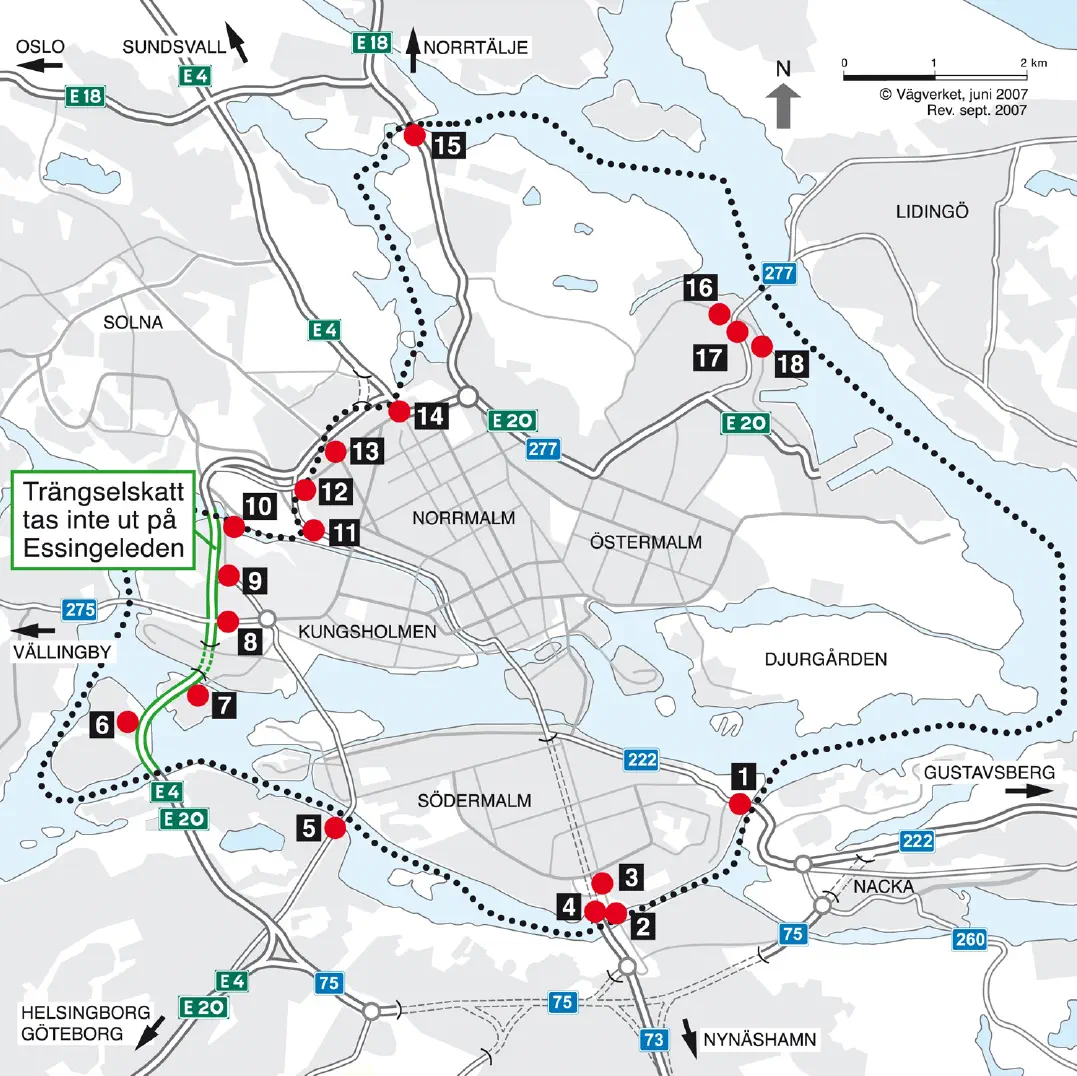
Tariffs
The fee amount depends on the day of the week and time of day.
The tax is levied on vehicles from Monday to Friday from 06:00 to 18:29.
No tax is collected on Saturdays, Sundays, public holidays, as well as on the eve of holidays and in the month of July.
Congestion Tax in Stockholm
The congestion tax is collected at specified times for vehicles entering the center of Stockholm and on Eslövsvägen Street when exiting.
The maximum amount per day and per vehicle is 135 Swedish kronor in the high season and 105 Swedish kronor in the low season. The high season is the period from March 1 to part of July (including the first 5 working days of July) and from August 15 to November 30. The low season is the rest of the time.
Time and cost of congestion tax in the center of Stockholm
| Hours | Rate in High Season, SEK | Rate in Low Season, SEK |
|---|---|---|
| 6:00-6:29 | 15 (€ 1,34) | 15 (€ 1,34) |
| 6:30-6:59 | 30 (€ 2,68) | 25 (€ 2,23) |
| 7:00-8:29 | 45 (€ 4,02) | 35 (€ 3,13) |
| 8:30-8:59 | 30 (€ 2,68) | 25 (€ 2,23) |
| 9:00–9:29 | 20 (€ 1,79) | 15 (€ 1,34) |
| 9:30–14:59 | 11 (€ 0,98) | 11 (€ 0,98) |
| 15:00–15:29 | 20 (€ 1,79) | 15 (€ 1,34) |
| 15:30–15:59 | 30 (€ 2,68) | 25 (€ 2,23) |
| 16:00–17:29 | 45 (€ 4,02) | 35 (€ 3,13) |
| 17:30–17:59 | 30 (€ 2,68) | 25 (€ 2,23) |
| 18:00–18:29 | 20 (€ 1,79) | 15 (€ 1,34) |
Congestion Tax on Essingeleden Expressway
Essingeleden is an approximately 8 km long expressway running from Solna to Stockholm, Sweden. It crosses the western part of central Stockholm, passing through Kungsholmen, Lilla Essingen, and Stora Essingen. Essingeleden was named in 1961 after two islands: Stora and Lilla Essingen. The road is part of the European routes E4 and E20, and it is the busiest road in Sweden.
| Hours | Rate in High Season | Rate in Low Season |
|---|---|---|
| 6:00-6:29 | 15 (€ 1,34) | 15 (€ 1,34) |
| 6:30-6:59 | 27 (€ 2,41) | 22 (€ 1,97) |
| 7:00-8:29 | 40 (€ 3,57) | 30 (€ 2,68) |
| 8:30-8:59 | 27 (€ 2,41) | 22 (€ 1,97) |
| 9:00–9:29 | 20 (€ 1,79) | 15 (€ 1,34) |
| 9:30–14:59 | 11 (€ 0,98) | 11 (€ 0,98) |
| 15:00–15:29 | 20 (€ 1,79) | 15 (€ 1,34) |
| 15:30–15:59 | 27 (€ 2,41) | 22 (€ 1,97) |
| 16:00–17:29 | 40 (€ 3,57) | 30 (€ 2,68) |
| 17:30–17:59 | 27 (€ 2,41) | 22 (€ 1,97) |
| 18:00–18:29 | 20 (€ 1,79) | 15 (€ 1,34) |
Detailed information on the entrance tax to the central part of Stockholm and driving on the Essingeleden highway on the website of the Swedish transport company (in Swedish).
Congestion Tax in Gothenburg
The maximum amount per day and per vehicle is 60 Swedish kronor.
The tax is not collected on public holidays, the day before holidays, and throughout the month of July.
Time and cost of congestion tax in Gothenburg
| Hours | Cost |
|---|---|
| 06:00 - 06:29 | 9 (€ 0,8) |
| 06:30–06:59 | 16 (€ 1,43) |
| 07:00–07:59 | 22 (€ 1,97) |
| 08:00–08:29 | 16 (€ 1,43) |
| 08:30–14:59 | 9 (€ 0,8) |
| 15:00–15:29 | 16 (€ 1,43) |
| 15:30–16:59 | 22 (€ 1,97) |
| 17:00–17:59 | 16 (€ 1,43) |
| 18:00–18:29 | 9 (€ 0,8) |
| 18:30–05:59 | 0 |
Multiple Passage Rule
The multiple passage rule means that a vehicle passing several toll stations within 60 minutes is taxed only once. The amount to be paid is the highest amount from these passages.
Detailed information on the time and cost of congestion tax in Gothenburg can be found on the Swedish Transport Agency's website (in Swedish).
If your car is registered abroad
For vehicles registered abroad, the Swedish Transport Agency has entrusted a partner with notification to identify vehicle owners, send invoices, and receive payments through EPASS24.
More information can be found on the EPASS24 website.
If you reside in Sweden
All passages by a specific vehicle within a calendar month are consolidated by the Swedish Transport Agency into a decision sent in the next tax month. Only after receiving the tax decision can you pay the tax. The payment must be credited to the Swedish Transport Agency for the congestion tax no later than the last day of the month following the month in which the tax decision was made.
Time flow
- 1 month
Trips of the vehicle are recorded throughout month 1 - 2 months
The tax decision for month 1 is determined and sent together with a payment card at the end of month 2. - 3 months
Payment for month 1 must be made to the Swedish Transport Agency's congestion tax account no later than the last day of month 3.
Taxpayers are responsible for timely payment of the tax, even if they do not receive a payment card from the Swedish Transport Agency. If the tax is not paid on time, an additional fee of 500 Swedish kronor (€45) is charged.
The vehicle cannot be used if there is unpaid congestion tax and an additional fee exceeding 5000 Swedish kronor, and at least six months have passed since the last payment of the amount exceeding 5000 (€450) Swedish kronor. The usage prohibition lasts until the total debt amount that led to the prohibition is paid. This also applies to cases where the unpaid tax/fee concerns previous owners.
Speed Limits

Standard speed limits in Sweden (unless otherwise indicated on signs).
Cars and motorcycles:- in urban areas – 30-60 km/h
- outside urban areas – 70-100 km/h
- on motorways – 110-120 km/h
- in urban areas – 50 km/h
- outside urban areas – 70 km/h
- on motorways – 80 km/h
Speed limits are not dependent on the type of road but rather on the quality and safety of the road itself. Speed limits may sequentially change while driving on the same road. Therefore, it is recommended to pay special attention to road signs.
If there are doubts and speed limit signs are absent, it is recommended to drive at a speed not exceeding 70 km/h until a speed limit sign is encountered.
Dipped Headlights
The use of dipped headlights is mandatory 24 hours a day, all year round.
Cost of Petrol in Sweden
Parking in Sweden
Parking on city streets is only allowed on the right side (parking against the traffic flow is not allowed). In most Swedish cities, street parking is paid from 8 am to 6 pm, Monday to Friday. The cost of parking is SEK 10-70 (€ 0.9-6.3) per hour.
If you are parking on the street overnight, pay attention to signs to ensure that the street won't be cleared that night.
Parking in garages and parking lots averages SEK 30-75 (€ 2.7-6.7) per hour.
The cheapest option is to use Park & Ride parking, located on the outskirts of cities. The cost of such parking is SEK 15-30 (€ 1.4-2.7) per day.

Parking in Stockholm
To find parking and its price in Stockholm, it is best to use either the mobile application mentioned below or the parking website in Stockholm with an interactive map showing all parking lots with parking time and hourly or daily rates. Rates vary from 70 Swedish Kronor (€6.26) in the city center to 10 Kronor (€0.89) in the suburbs. https://www.stockholmparkering.se/hitta-oss-pa-kartan/
On the website, you can also find garages. Garages usually have a night rate from 00:00 to 08:00 and an evening rate from 19:00 to 00:00. The night or evening rate is 75 Swedish Kronor (€6.72).
The cheapest Park and Ride (P+R) lots can also be found by searching the map. The rate is approximately 30 Kronor per day (€2.7). The advantage of such lots is that they operate 24 hours a day, so if you need to leave at night, it can be done without any problems, unlike garages that may close at night.
How to Pay?
The easiest way to pay for parking is to use the Betala P mobile application. As a customer, you can use the Betala P service to pay at all parking lots and streets managed by the city. Betala P is neutral, and no additional fees are charged, except for the parking fee.
You can download the application: App Store Google Play
More information about the application and support service contacts on the website Stockholm Parkering
Mandatory Equipment
Equipment that must be in the car:| Antifreeze windshield washer - non-freezing windshield washer fluid | |
| Shovel - for snow clearing |
| First aid kit | |
| Fire extinguisher | |
| Emergency stop sign | |
| Towing rope | |
| Reflective vest |
Winter Tires, Studded Tires, Chains
| Usage of winter tires (marked M+S, M.S, M-S, M&S with a minimum tread depth of 3 mm) is mandatory in Sweden from December 1 to March 31 during winter weather conditions.
These requirements apply to vehicles registered both in Sweden and abroad. Road conditions are considered winter when there is snow, ice, slush, or wet roads in combination with temperatures around 0 degrees Celsius or lower. The Swedish police make the decision on whether the conditions are considered winter on a specific road. Since predicting weather conditions in advance is challenging, it is strongly recommended to use winter tires. |
|
| Usage of chains is allowed only when the road is completely covered with snow or ice. | |
| Usage of studded tires is allowed from October 1 to April 15. This period may be extended due to weather conditions. Studded tires must be installed on all wheels. The trailer, in this case, must also be equipped with studded tires. |
 travels
travels Albania
Albania Andorra
Andorra Austria
Austria Azerbaijan
Azerbaijan Belarus
Belarus Belgium
Belgium Bosnia and Herzegovina
Bosnia and Herzegovina Bulgaria
Bulgaria Croatia
Croatia Cyprus
Cyprus Czech Republic
Czech Republic Denmark
Denmark Estonia
Estonia Finland
Finland France
France Georgia
Georgia Germany
Germany Greece
Greece Hungary
Hungary Iceland
Iceland Ireland
Ireland Italy
Italy Kosovo
Kosovo Latvia
Latvia Liechtenstein
Liechtenstein Lithuania
Lithuania Luxembourg
Luxembourg Malta
Malta Moldova
Moldova Monaco
Monaco Montenegro
Montenegro Netherlands
Netherlands North Macedonia
North Macedonia Norway
Norway Poland
Poland Portugal
Portugal Romania
Romania Russia
Russia San Marino
San Marino Serbia
Serbia Slovakia
Slovakia Slovenia
Slovenia Spain
Spain Switzerland
Switzerland Turkey
Turkey Ukraine
Ukraine United Kingdom
United Kingdom